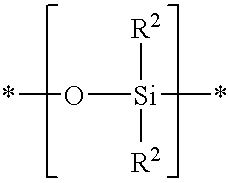Transparent polycarbonate-polysiloxane copolymer blend, method for the preparation thereof, and article derived therefrom
a polycarbonate polymer and polysiloxane technology, applied in the field of transparent polycarbonatepolysiloxane copolymer blend, method for the preparation thereof, and article derived therefrom, can solve the problems of requiring separate handling and coating steps, and the surface-modifying additive required to obtain the desired surface properties often detract from the optical properties of the base copolymer
- Summary
- Abstract
- Description
- Claims
- Application Information
AI Technical Summary
Benefits of technology
Problems solved by technology
Method used
Image
Examples
examples 10 and 11
, COMPARATIVE EXAMPLES 15 AND 16
[0109]These experiments show that the addition of a surface modifying agent to a polycarbonate-polysiloxane copolymer can improve the hemocompatibility of the composition. Four compositions were tested for their effect on platelet count, using a procedure different from that described above. The procedure was conducted in two steps, the first being exposure of blood to the test materials, and the second being measurement of platelet count. To expose blood to the test materials, blood from human volunteers was collected into the anticoagulant, citrate phosphate dextrose. Citrate phosphate dextrose solution contains 0.299 grams of citric acid anhydrate USP, 2.63 grams of sodium citrate dehydrate USP, 0.222 grams of monobasic sodium phosphate monohydrate USP, 2.90 grams of dextrose, 0.027 grams of adenine USP, and 100 milliliters of water. Forty-nine (49) milliliters of this buffer was used to collect 350 milliliter of blood. The test materials, provided...
examples 12 – 14
EXAMPLES 12–14, COMPARATIVE EXAMPLES 17 AND 18
[0112]These experiments illustrate variation of the surface modifying agent. The controls were a polycarbonate homopolymer (Comparative Example 17) and a polycarbonate-polysiloxane copolymer (Comparative Example 18). The polycarbonate homopolymer was a bisphenol A polycarbonate having a weight average molecular weight of 21,800 AMU. The polycarbonate-polysiloxane block copolymer had 6% siloxane by weight and siloxane segments having a chain length of about 50 units. Examples 12–14 each contained 99 weight percent polycarbonate-polysiloxane block copolymer and 1 weight percent of a surface modifying agent. In Example 12, the surface modifying agent was the polycaprolactone-polysiloxane-polycaprolactone triblock copolymer obtained from Goldschmidt as TEGOMER® H-Si 6440P. In Example 13, the surface modifying agent was a water-soluble polyethylene oxide-polydimethylsiloxane-polyethylene oxide triblock copolymer having a total siloxane conten...
PUM
| Property | Measurement | Unit |
|---|---|---|
| weight percent | aaaaa | aaaaa |
| weight percent | aaaaa | aaaaa |
| weight percent | aaaaa | aaaaa |
Abstract
Description
Claims
Application Information
 Login to View More
Login to View More - R&D
- Intellectual Property
- Life Sciences
- Materials
- Tech Scout
- Unparalleled Data Quality
- Higher Quality Content
- 60% Fewer Hallucinations
Browse by: Latest US Patents, China's latest patents, Technical Efficacy Thesaurus, Application Domain, Technology Topic, Popular Technical Reports.
© 2025 PatSnap. All rights reserved.Legal|Privacy policy|Modern Slavery Act Transparency Statement|Sitemap|About US| Contact US: help@patsnap.com



